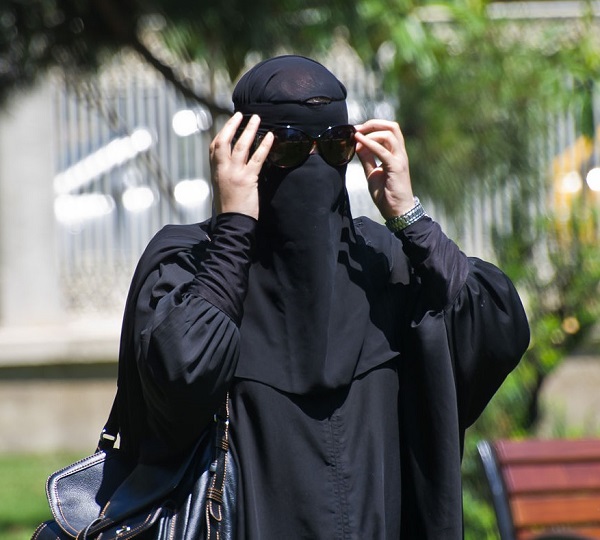

The popular initiative ‘Yes to a ban on full facial coverings’, or the Burqa Ban, demands that no one be able to cover up their face completely in Switzerland
<p>
<strong>Switzerland is set to vote Sunday a nationwide prohibition on face coverings which would also make wearing Muslim veils in public illegal. Now trending as a &#39;burqa ban&#39;, the initiative is led by the Egerkingen Committee which was the driving force behind Switzerland becoming the first country in Europe to ban the construction of minarets in 2009.&nbsp;</strong></p>
<p>
Backed by right-wing populist Swiss People&#39;s Party, the proposed law is expected to sail through with a majority in a binding national referendum on March 7 even as calls for collective Muslim action against &#39;Islamophobia&#39; are rising.</p>
<p>
The popular initiative &lsquo;Yes to a ban on full facial coverings&rsquo; demands that no one be able to cover up their face completely in Switzerland. This rule would apply anywhere that is publicly accessible, such as in the streets, in public offices, on public transport, at football stadiums, in restaurants, shops or in the open countryside.</p>
<p>
The government said that exceptions will only be permitted in places of worship and at other sacred sites, for health and safety reasons, because of the weather and because of Swiss custom. There will be no additional exceptions, for example for tourists who wish to wear facial coverings.</p>
<p style="text-align: center;">
<img alt="Swiss Burqa Ban" src="https://www.indianarrative.com/upload/news/Swiss_BURQA_BAN_Switzerland.jpg" style="width: 100%; height: 100%;" /><em><strong>Swiss People&#39;s Party is backing the initiative &lsquo;Yes to a ban on full facial coverings&rsquo;&nbsp;(Image: Twitter/@SVPch)</strong></em></p>
<p>
The country had been debating whether to introduce a ban on full facial coverings for several years. While the Federal Council and Parliament have always opposed a nationwide ban, at cantonal level, St Gallen and Ticino have introduced a ban on full facial coverings. In several cantons, a ban on facial coverings at political demonstrations applies.</p>
<p>
A counter-proposal, which can only come into force if the initiative is rejected, has also been tabled by the government and Parliament which would require persons to show their faces to the police or other officials if this is necessary for identification purposes.</p>
<p>
However, chances of that happening remain low. Opinion polls suggest that the majority are in favour of ban on facial coverings like the niqab &ndash; a veil worn by the Muslim women.</p>
<p>
&quot;At present, almost 60 percent of those entitled to vote are in favor. However, the no-camp has caught up compared to the last survey. The adoption of the initiative remains likely, according to the forecasting model, which includes historical data and previous polls,&quot; said a survey carried out by 20 Minuten and Tamedia.</p>
<p>
If the ban becomes reality, Switzerland would become the latest European Union member country to pass such a legislation which affects Muslim women majorly.&nbsp;</p>
<p>
Since 2010, countries like Belgium, Denmark, Bulgaria, France, Austria and the Netherlands have laws already in place to prohibit the wearing of clothing that completely or partially conceals the face.</p>
<p>
Not everyone thinks it as &#39;Islamophobia&#39; though. Several Muslim thinkers and organisations find fighting religious extremism and obscurantism as progressive.</p>
<p>
&quot;Supporters argue a face covering ban helps prevent terrorist attacks and other forms of violence. At the same time, the ban is seen as a way to promote equality between Muslim women and men, giving women freedom from a discriminatory patriarchal society,&quot; reported Swiss Broadcasting Corporation (SBC).</p>
<p>
After suffering a wave of Islamist militant attacks in recent years, several European countries have taken fresh measures to prevent the spread of radical Islamic extremism in communities.</p>
<p>
In January, French President Emmanuel Macron had praised leaders from the French Council of the Muslim Faith (CFCM) for agreeing on a &quot;charter of principles&quot; to eradicate sectarianism and extremism in the country.</p>
<p>
France&#39;s National Assembly had last month also approved a legislation mainly to target &quot;the nefarious ideology of radical Islamism&quot;.</p>
<p>
Last year, Austria announced the launch of a &#39;Documentation Centre/Observatory for Political Islam&#39; to provide information and research into political Islam and extremism.</p>
By Ajit Dubey The Indian Air Force is carrying out Exercise Aakraman (Attack) over a…
Several Indian American organisations have strongly condemned the recent terrorist attack in Jammu and Kashmir's…
Prime Minister Narendra Modi on Thursday spoke to the Prime Minister of Israel, Benjamin Netanyahu…
India's Sun Pharma and Israel's Moebius Medical published new data on MM-II, a non-opioid treatment…
Reliance Industries Chairman and Managing Director, Mukesh Ambani, joined the nation in mourning the deaths…
Chinese generative AI platform DeepSeek passed on personal details of Korean users to firms in…